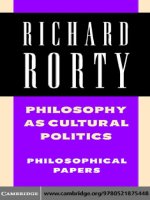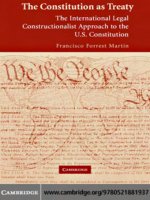cambridge university press judges beyond politics in democracy and dictatorship lessons from chile jul 2007 kho tài liệu bách khoa
Bạn đang xem bản rút gọn của tài liệu. Xem và tải ngay bản đầy đủ của tài liệu tại đây (1.93 MB, 317 trang )
This page intentionally left blank
JUDGES BEYOND POLITICS IN DEMOCRACY
AND DICTATORSHIP
Why did Chilean judges, trained under and appointed by democratic governments, facilitate and condone the illiberal, antidemocratic, and antilegal
policies of the Pinochet regime? Challenging the common assumption that
adjudication in nondemocratic settings is fundamentally different and less
puzzling than it is in democratic regimes, this book offers a longitudinal analysis of judicial behavior, demonstrating striking continuity in judicial performance across regimes in Chile. The work explores the relevance of judges’
personal policy preferences, social class, and legal philosophy but argues
that institutional factors best account for the persistent failure of judges to
take stands in defense of rights and rule of law principles. Specifically, the
institutional structure and ideology of the Chilean judiciary, grounded in
the ideal of judicial apoliticism, furnished judges with professional understandings and incentives that left them unequipped and disinclined to take
stands in defense of liberal democratic principles before, during, and after
the authoritarian interlude.
Lisa Hilbink is a two-time Fulbright grantee to Chile and Spain. From 2000
to 2003, she was Post-Doctoral Fellow in the Princeton University Society
of Fellows and Lecturer at the Woodrow Wilson School of Public and International Affairs. Her doctoral thesis, on which this book is based, won the
Best Dissertation Award for 1999/2000 from the Western Political Science
Association. Dr. Hilbink is a member of the American Political Science Association, the Law and Society Association, and the Latin American Studies
Association. She is now Assistant Professor at the University of Minnesota,
Twin Cities.
CAMBRIDGE STUDIES IN LAW AND SOCIETY
Cambridge Studies in Law and Society aims to publish the best scholarly work
on legal discourse and practice in its social and institutional contexts, combining theoretical insights and empirical research.
The fields that it covers are studies of law in action; the sociology of law;
the anthropology of law; cultural studies of law, including the role of legal
discourses in social formations; law and economics; law and politics; and
studies of governance. The books consider all forms of legal discourse across
societies, rather than being limited to lawyers’ discourses alone.
The series editors come from a range of disciplines: academic law, sociolegal studies, and sociology and anthropology. All have been actively involved in teaching and writing about law in context.
Series Editors
Chris Arup
Victoria University, Melbourne
Martin Chanock
La Trobe University, Melbourne
Pat O’Malley
University of Sydney, Australia
Sally Engle Merry
Wellesley College, Massachusetts
Susan Silbey
Massachusetts Institute of Technology
Books in the Series
The Politics of Truth and Reconciliation in South Africa
Legitimizing the Post-Apartheid State
Richard A. Wilson
Modernism and the Grounds of Law
Peter Fitzpatrick
Unemployment and Government
Genealogies of the Social
William Walters
Autonomy and Ethnicity
Negotiating Competing Claims in Multi-Ethnic States
Yash Ghai
Constituting Democracy
Law, Globalism and South Africa’s Political Reconstruction
Heinz Klug
The New World Trade Organization Agreements
Globalizing Law through Services and Intellectual Property
Christopher Arup
The Ritual of Rights in Japan
Law, Society, and Health Policy
Eric A. Feldman
The Invention of the Passport
Surveillance, Citizenship, and the State
John Torpey
Governing Morals
A Social History of Moral Regulation
Alan Hunt
The Colonies of Law
Colonialism, Zionism, and Law in Early Mandate Palestine
Ronen Shamir
Law and Nature
David Delaney
Social Citizenship and Workfare in the United States and Western Europe
The Paradox of Inclusion
Joel F. Handler
Law, Anthropology, and the Constitution of the Social
Making Persons and Things
Edited by Alain Pottage and Martha Mundy
Judicial Review and Bureaucratic Impact
International and Interdisciplinary Perspectives
Edited by Marc Hertogh and Simon Halliday
Immigrants at the Margins
Law, Race, and Exclusion in Southern Europe
Kitty Calavita
Lawyers and Regulation
The Politics of the Administrative Process
Patrick Schmidt
Law and Globalization from Below
Toward a Cosmopolitan Legality
Edited by Boaventura de Sousa Santos and Cesar A. Rodriguez-Garavito
Public Accountability
Designs, Dilemmas, and Experiences
Edited by Michael W. Dowdle
Law, Violence, and Sovereignty among West Bank Palestinians
Tobias Kelly
Law and Society in Vietnam
The Transition from Socialism in Comparative Perspective
Mark Sidel
Legal Reform and Administrative Detention Powers in China
Sarah Biddulph
The Practice of Human Rights
Tracking Law between the Global and the Local
Edited by Mark Goodale and Sally Engle Merry
JUDGES BEYOND
POLITICS IN
DEMOCRACY AND
DICTATORSHIP
Lessons from Chile
Lisa Hilbink
University of Minnesota, Twin Cities
CAMBRIDGE UNIVERSITY PRESS
Cambridge, New York, Melbourne, Madrid, Cape Town, Singapore, São Paulo
Cambridge University Press
The Edinburgh Building, Cambridge CB2 8RU, UK
Published in the United States of America by Cambridge University Press, New York
www.cambridge.org
Information on this title: www.cambridge.org/9780521876643
© Lisa Hilbink 2007
This publication is in copyright. Subject to statutory exception and to the provision of
relevant collective licensing agreements, no reproduction of any part may take place
without the written permission of Cambridge University Press.
First published in print format 2007
eBook (EBL)
ISBN-13 978-0-511-29523-2
ISBN-10 0-511-29523-5
eBook (EBL)
hardback
ISBN-13 978-0-521-87664-3
hardback
ISBN-10 0-521-87664-8
Cambridge University Press has no responsibility for the persistence or accuracy of urls
for external or third-party internet websites referred to in this publication, and does not
guarantee that any content on such websites is, or will remain, accurate or appropriate.
To Dad,
who gave me my sense of justice,
and to Mom,
who devoted her life to peace.
CONTENTS
Acknowledgments
Introduction
Overview of the Argument
Methodology and Data Reporting
Plan of the Book
1 The Judiciary, the Rule of Law, and Democracy: Aspirations
and Impediments
The Judicial Role in Democracy and Democratization
So Why Bother with Judges?
The Roots of Judicial Behavior in General
Judicial Behavior in Illiberal Contexts: Specific Hypotheses
The Regime-Related Explanation
The Attitudinal Explanation
The Class-Based Explanation
The Legal Theory Explanation
The Institutional Argument
2 The Institutional Construction of the Judicial Role in Chile
Law and Courts in Colonial Times and in Early Independence
Law and Courts under the Portalian Republic
Law and Courts before and during the Parliamentary Republic
The Judiciary in Constitutional Transition and Dictatorship
The Development of Conservative Judicial Activism from 1932
to the 1960s
Conclusion
3 Conservative Activism in the Heyday of Democracy,
1964–1973
The Judicial Role in the Frei and Allende Years
Explaining the Judicial Role under Frei and Allende
Conclusion
page xiii
1
5
8
11
13
14
18
23
27
27
29
30
31
33
41
42
46
51
55
63
71
73
75
88
101
ix
CONTENTS
4 Legitimizing Authoritarianism, 1973–1990
PART I: 1973–1980: “THE RULE OF LAW SHOW”
The Military Government’s Approach to Law (1973–1980)
The Judicial Response to Military Law and Policy
(1973–1980)
Habeas Corpus (Amparo)
Review of Military Court Decisions
Constitutional Review (Inaplicabilidad por
Inconstitucionalidad)
The New Constitutional Review Mechanism: Recurso de
Protecci´on
High-Profile Public Law Cases
Summary, 1973–1980
PART II: 1981–1990: THE “NEW INSTITUTIONAL ORDER”
The Military Government’s Approach to Law (1981–1990)
The Judicial Response to Military Law and Policy
(1981–1990)
Habeas Corpus (Amparo)
Constitutional Review I: Recursos de Protecci´on
Constitutional Review II: Inaplicabilidad por
Inconstitucionalidad
High-Profile Public Law Cases
Summary, 1981–1990
102
106
106
114
115
120
122
124
126
129
131
131
137
141
144
147
150
156
PART III: EXPLAINING THE JUDICIAL ROLE UNDER
PINOCHET, 1973–1990
Regime-Related Factors
Political Attitudes and Preferences
Legal Philosophy
Institutional Structure and Ideology
Conclusion
5 Continuity and Change after the Return to Democracy,
1990–2000
Democratic-Era Efforts to Liberalize Law and Justice
The Judicial Role in the 1990s
Decisions in Authoritarian-Era Rights Cases
Decisions in Postauthoritarian Rights Cases
Explaining the Judicial Role in the New Democracy
Conclusion
x
157
157
160
166
168
176
177
179
189
189
203
208
222
CONTENTS
6 Conclusions and Implications
Institutionalized Apoliticism
Institutionalized Apoliticism in Comparative Perspective
Broader Implications of the Argument
The Limits of Judicial Independence
Institutions as Rules and Roles
In Defense of Political Courts
223
224
229
239
240
242
243
Appendix A:Orienting Information on Chilean Law and Courts
251
Appendix B:List of Interviewees (alphabetical by category)
257
References
Index
261
287
xi
ACKNOWLEDGMENTS
They say it is difficult to let go of one’s first book, and that is particularly
true in my case. Despite the many sources of moral and material support
I received from the time I began this project, as a dissertation, to the
late phases of the book revisions, it was still difficult to convince myself
that it was, or would ever be, ready for public consumption. Because of
this, I held on to it for too long and racked up an inordinate number of
debts, which I can only modestly acknowledge in these few preliminary
lines.
To begin, I would like to express my sincere gratitude to the various
institutions that provided funding for the research and writing of this
book. The original research in Chile was made possible by a grant from
the J. William Fulbright Foreign Scholarship Board. Follow-up trips
were supported by grants from the University Committee on Research
in the Humanities and Social Sciences, the Woodrow Wilson School,
and the Faculty Research Grant Committee of the Program in Latin
American studies, all of Princeton University. Much of the reading and
thinking that went into the theoretical framework of the book was done
during my years as a Wilson-Cotsen Fellow in the Princeton University
Society of Fellows in the Liberal Arts. I thus owe a tremendous thank
you to both the Woodrow Wilson School and the Society of Fellows for
their financial support during that time. Finally, I thank the College of
Liberal Arts and the Department of Political Science at the University
of Minnesota, which provided the general research funds on which I
drew for write-up support and assistance.
I also extend profound thanks to the many Chilean individuals and
institutions who aided and cooperated in this study. Many judges and
lawyers, whom I promised anonymity, gave me interviews of two or
more hours; others typed out long answers to each of my questions.
I am most honored by and very appreciative of the time and trust
they offered me. I am also grateful to the personnel of many institutions which facilitated my work, including persons at the Biblioteca
de la Corte Suprema, the Biblioteca del Congreso, the Biblioteca
xiii
ACKNOWLEDGMENTS
Nacional, the Comisi´on Chilena de Derechos Humanos, the Fundaci´on
Archivo y Documentaci´on de la Vicar´ıa de la Solidaridad, and, above
all, the Universidad Diego Portales, Facultad de Ciencias Jur´ıdicas y
Sociales.
Chilean scholars Jorge Correa, Hugo Fr¨uhling, and Augusto Varas
deserve special recognition for their guidance at crucial stages of the
study. Rodolfo Aldea, Jos´e Luis Cea, Fernando Escobar, and Alex Wilde
also provided invaluable insights, advice, and pitutos. In addition, I
thank faculty members at the Diego Portales Law School from whom I
learned so much both in private discussions and public seminars: Mauricio Duce, Gaston G´omez, Felipe Gonz´alez, Mar´ıa Ang´elica Jim´enez,
˜ and Cristian Riego. Finally,
Cecilia Medina, Jorge Mera, Carlos Pena,
for their intellectual support and friendship, I want to thank Mario
˜ Javier Couso, Pablo Policzer, and the late Marta P´erez. Long
Bugueno,
conversations with each of these individuals broadened and deepened
my general understanding of and love for Chile and helped make this
book much richer.
In the United States, I have personal and intellectual debts on both
coasts, as well as in my new – or, better put, rediscovered – home in the
heartland. I could not begin to offer sufficient thanks to my adviser, Paul
Drake, and to the other members of my dissertation committee at the
University of California-San Diego (UC-SD), Ann Craig, Harry Hirsch,
Jim Holston, Alan Houston, and Carlos Waisman. Each contributed in
essential ways to my intellectual and professional development during my time at UC-SD and has continued to support me in the years
since then. I am also grateful to the great UC-SD friends that helped
keep me sane during graduate school and beyond, especially Octavio
Amorim-Neto, Steve Applebaum, Michele Chang, Maureen Feeley,
Chris Fry, Bill Griswold, Kim Harley, Sohie Lee, Minna Mahlab, and Jay
Moody.
As a post-doc at Princeton, I had the extraordinary privilege to
work with a wide range of brilliant faculty, visiting scholars, and graduate students who stimulated my thinking on law, politics, and justice and gave generously of their time to help me improve my work.
These include Jeremy Adelman, Pablo de Grieff, Patrick Deneen, Jim
Doig, Kent Eaton, Christopher Eisgruber, David Erdos, Carol Greenhouse, Gabor Halmai, Valerie Hunt, Stan Katz, Steven Macedo, Diane
Orentlicher, Kal Raustiala, Bruce Rutherford, Kim Scheppele, Paul Sigmund, Nate Skovronick, Martin Stein, Keith Whittington, Melissa
xiv
ACKNOWLEDGMENTS
Williams, Deborah Yashar, Mariah Zeisberg, and the directors and fellows of the Society of Fellows. I am particularly indebted to the members
of our first-book writing group, Ana Mar´ıa Bejarano, Erica Cosgrove,
and Sarah Pralle, who suffered through the reading of my extremely
long and dense dissertation chapters, gave me excellent feedback, and
became dear friends.
My good fortune continued when I joined the Department of Political Science at the University of Minnesota, where I have enjoyed the
professional support and friendship of extraordinarily gifted, sensitive,
and good-humored colleagues. While I am grateful to so many of them
for their contributions to my “subjective well-being,” I owe particular
thanks to Sally Kenney, David Samuels, Bill Scheuerman, and Kathryn
Sikkink, each of whom read chapters of the book manuscript and gave
me valuable comments, criticisms, and advice.
I also have debts to numerous individuals in my wider intellectual community who read and critiqued pieces of this work along the
way, and/or offered general support and encouragement. These include
John Brigham, Daniel Brinks, Rebecca Bill Ch´avez, Jodi Finkel, Bryant
Garth, Tom Hilbink, Diana Kapizewski, Brian Loveman, Michael
McCann, Jonathan Miller, Tamir Moustafa, Tony Pereira, Miguel Schor,
Dru Scribner, Hootan Shambayati, Matthew Taylor, and Joe Thome.
For their excellent research and/or editing assistance at different stages
of the manuscript drafting, I thank Glen Gutterman, Jennifer Kwong,
Mat´ıas Larra´ın, Daniel Levin, and Marcela Villarrazo. Dan, in particular, deserves a huge thank you for his enthusiastic and meticulous work
on the draft I sent for review. Last, but not least, for their gentle guidance and incredibly efficient editorial work, I thank John Berger of
Cambridge University Press, and the project manager at Aptara, Inc.,
Barbara Walthall.
The contributions of all the individuals and institutions listed above
are important but can only pale next to those of my amazing and wonderful family. The enormous and repeated sacrifices they made in order
to support the research and writing of this book humble me. It is not
easy to have an academic mother, wife, daughter or sister, particularly
one whose research requires that she spend long periods in foreign
lands, but my children, husband, parents, and brother have all endured
and supported, with unflagging love, humor, and flexibility, the ups
and downs of the crazy life I (and, hence, they) lead. My deepest
thanks thus go to Ron and Dottie Hilbink, Tom Hilbink, Ed and Merry
xv
ACKNOWLEDGMENTS
Gerber, and Jamie, Noah, and Liliana Gerber for their endless emotional and material support. Sadly, the one who gave the most of all –
my mother, Dottie – is no longer here to read these lines. She passed
away in July of 2006, but her intellectual influence and gifts of self are
reflected in every page of this work. It is thus to her, and to my brilliant
and loving father, that this book is dedicated.
xvi
INTRODUCTION
On September 11, 1973, General Augusto Pinochet helped to lead
the overthrow of one of Latin America’s most celebrated democratic
regimes. As part of the coup, Chile’s military leaders bombed the presidential palace, shut down the Congress, closed or banned political
parties, and purged the state bureaucracy. They left the courts, however, completely untouched. In the face of state terror, Chilean human
rights defenders thus placed their hopes in the judiciary as the only
branch of the democratic state left intact.
To the dismay of justice seekers, Chilean judges cooperated fully with
authoritarian regime in the months and years that followed. Not only
did the courts grant the military government nearly complete autonomy
to pursue its “war” against Marxism, but they also offered repeated legal
justification of the regime’s expansive police powers. Judges unquestioningly accepted the explanations offered by the government regarding the fate of the disappeared and readily implemented arbitrary
decrees, secret laws, and policies that violated the country’s legal codes.
The Supreme Court, mouthpiece of the judiciary, publicly endorsed
General Pinochet’s seizure of power and declared that writs of habeas
corpus disrupted the Court’s ability to deal with the “urgent matters
of its jurisdiction.” Indeed, of the more than fifty-four hundred habeas
corpus petitions filed by human rights lawyers between 1973 and 1983,
the courts rejected all but ten (Constable and Valenzuela 1991: 122).
Moreover, the Supreme Court unilaterally abdicated both its review
power over decisions of military tribunals and its constitutional review
1
JUDGES BEYOND POLITICS IN DEMOCRACY AND DICTATORSHIP
power.1 Throughout, the justices insisted that the military government
was restoring the rule of law, even as the generals made a mockery
of the Constitution. Even after civilian rule had been restored, judges
continued to endorse the legal edifice constructed by the leaders of the
authoritarian regime (including the military’s self-amnesty), and left
largely unchallenged the principles and values embodied therein.2
This performance – which extended from passive capitulation to outright collaboration in authoritarian rule – demands explanation at several levels. To begin, such judicial behavior, in any context, shocks the
moral conscience. As with antebellum American judges who applied
the Fugitive Slave Laws, German judges who implemented Nazi law, or
South African judges who imparted legal legitimacy to apartheid (Cover
1975; M¨uller 1991; Dyzenhaus 1991; Osiel 1995), one is driven to ask
how and why professionals charged with administering justice could turn
a blind eye to – or worse, offer justification for – state-sponsored (and
often arbitrary) degradation, repression, and brutality. Such behavior
is at odds both with (Western) society’s moral expectations for professionals, in general, and for judges, in particular. As Paul Camenisch has
argued, professionals are “bearers of a public trust, bestowed upon them
in the form of a professional degree and title, and endowing them with
a monopoly in the provision of a service which is crucial to society.”
They have “significant power which can be used either for great societal
benefit or to considerable societal harm,” and thus “they can rightly be
accused of failure not only when they use their power, influence and
expertise for the wrong purposes, purposes which are positively harmful, but also when they fail to use them for the proper purposes, or even
fail to do so with sufficient energy and perseverance” (Camenisch 1983:
15 and 17). Like physicians who provided their professional services
to the regime’s torturers, then, judges who offered legal endorsement
of state-sponsored brutality opened themselves up to ethical critique.
But of course judges are subject to particular scrutiny because, as professionals, they are trained and take oaths to administer justice, or at
least to uphold the constitution and the laws, which contain principles
1
For the official critique of the conduct of the judiciary under the military regime, see
Ministerio Secretar´ıa General 1991: Vol. 1, Ch. 4.
2
This only began to change in the late 1990s, following institutional reform and the
detention of General Pinochet in London. The extent and limits of this change will
be discussed in Chapter 5.
2
INTRODUCTION
of justice. The judges in Pinochet’s Chile had been trained and appointed under a democratic regime and had taken an oath to uphold
the constitution of that regime, which provided a host of liberal and
democratic protections. Why was it that they so easily ignored that oath
and supported, sometimes passively, other times actively, the illiberal,
antidemocratic, and anti-legal agenda of the military government?
This question becomes even weightier when considered in light of
Chile’s political culture and history. In a continent plagued by political violence and instability, pre-Pinochet Chile had often been touted
as “exceptional” (Valenzuela 1989: 160 and 172).3 Whereas the political histories of other countries in the region often featured “brutal,
distorted, manipulated, political institutions and pseudo-liberal democratic regimes” (Diamond and Linz 1989: 20) and “[an absence of] traditions of participation, contestation, and toleration of dissent” (Waisman
1989: 63), Chile stood out for its “high level of party competition and
popular participation, open and fair elections, and strong respect for
democratic freedoms” (Valenzuela 1989: 160; see also Valenzuela and
Valenzuela 1983). In fact, a 1965 index that ranked countries in terms of
democratic performance placed Chile in the top 15 percent, above the
United States, France, Italy, and West Germany (Bollen 1980).4 Chile
also boasted a “strong historical tradition of respect for the rule
of law and a constitutional framework of presidential government”
(Valenzuela 1995: 31). In contrast to Brazil or Mexico, where the law
is very unevenly applied across the territory, or to Argentina, which
is notorious for its systemic corruption, Chile has long distinguished
itself by its rule-bound and orderly society. As one prominent Chilean
social scientist argued in 1974: “One of the most characteristic political realities of Chile is the importance of legality as a superior standard [instancia] to which all behaviors and the resolution of conflicts
between people and institutions are referred. . . . Legality is the foundation of the government’s legitimacy” (Arriagada 1974: 122).5 Why
3
See also Blakemore (1993), who notes that, in the nineteenth century, Chile was
considered “the England of Latin America”; and Dahl (1971), in which Chile figures
as a prominent case of successful democratic development.
4
For a more critical perspective on Chile’s “democratic exceptionalism,” see Loveman
and Lira (2002).
5
Similarly, Chilean constitutional lawyer Jos´e Luis Cea (1978: 6) notes that at the
conclusion of the 1960s, “the Chilean population, by and large, had been educated in
respect for the principle of legality, which it had internalized as its own. In accordance
3
JUDGES BEYOND POLITICS IN DEMOCRACY AND DICTATORSHIP
was it that Chilean judges so easily abandoned these alleged national
traditions?
The behavior of Chilean judges is particularly remarkable when contrasted to that displayed by judges in countries with ostensibly far less
democratic and legalistic traditions, such as Brazil and Argentina.6 After
the 1964 coup in Brazil, the Supreme Court, left intact by the junta,
repeatedly called the generals on their affront to the historic Brazilian
constitution, even after the military attempted to stack it with more
sympathetic judges (Karst and Rosenn 1975; Feinrider 1981; Nadorff
1982; Osiel 1995).7 Lower courts and even military courts also sought
to limit what the military government could do in the name of national
security, although the former were quickly deprived of their independence (Ballard 1999: 241; Pereira 2005: 77). In Argentina, a thoroughly
purged judiciary first capitulated almost completely to the ruling junta,
but, toward the end of the regime, began issuing general rulings limiting
the military’s power (Helmke 2002).
The central question that this book seeks to answer is thus: Why did
Chilean judges who had been trained under and appointed by democratic governments facilitate and condone authoritarian policies? Put
differently, why in a country with such a long history of democratic
practice and respect for legality, a country whose human rights movement was one of the strongest on the continent, did judges make no
public and concerted effort to defend liberal democratic principles and
practices, not only under Pinochet but well into the 1990s? In answering
this question, the book speaks to debates in public law and comparative politics regarding the roots of judicial behavior, the definition and
limits of judicial independence, and the way the judicial role should
be conceived and constructed to promote the rule of law and rights
protection.
with said principle, the rulers as well as the ruled could act only to the extent that
an explicit legal precept, technically generated, had previously ordered, permitted,
or prohibited that action.”
6
It is also surprising given that Chile’s judiciary was commonly thought to be much
more independent than its Argentine counterpart (Verner 1984).
7
In October 1965, the Brazilian junta passed Institutional Act No. 2, which expanded
the Supreme Court from eleven to sixteen members and gave exclusive judicial
appointment power to the executive. This did not achieve the desired level of
compliance from the high court, however, so in late 1968 and early 1969, through
Institutional Acts 5 and 6, the junta reduced membership on the court back down
to eleven and forced three of the acting justices into early retirement, which led the
Supreme Court president to resign in protest (see Ballard 1999: 241).
4
INTRODUCTION
OVERVIEW OF THE ARGUMENT
The main argument put forth in this book is that the behavior of
Chilean judges under Pinochet is attributable largely to institutional
factors. Although I also highlight the importance of the personal political views of some judges, particularly on the powerful Supreme Court,
that factor alone is not sufficient to explain the courts’ paltry defense of
liberal democratic principles not just during, but also before and after,
the authoritarian interlude. To account fully for the weak response of
the judiciary to violations of constitutionalist principles (i.e., liberal
and democratic rights and limited power), it is necessary to understand how the institutional setting fostered and amplified illiberal and
even antidemocratic attitudes, but constrained the development and
expression of liberal democratic perspectives.8 The institutional structure and institutional ideology of the Chilean judiciary, historically
constructed around the concept of apoliticism, provided professional
understandings and incentives that rendered even democratic-minded
judges unequipped and disinclined to take stands in defense of liberal
democratic principles.
Some definitions and clarifications are necessary to make sense of
this claim. To begin, by “institutional structure” I mean the organizational rules governing the powers and duties of different offices within
the institution, including their relationship to each other and to other
government offices. By “institutional ideology” I mean the discrete and
relatively coherent set of ideas shared by members of the institution
regarding the institution’s social function or role, that is, the professional norms that guide behavior within the institution (Smith 1988).
These norms were both embodied in and reproduced by the institutional
structure. In saying that these institutional features were historically
constructed around the concept of “apoliticism,” I mean that they were
developed in the nineteenth and early twentieth centuries with the
goal of keeping judges insulated from and out of the debates and affairs
of the elected branches. Beyond simply securing judicial independence
from partisan manipulation – a worthy ideal – the judicial structure
and ideology in Chile built a high conceptual wall between “law” and
“politics.” However, far from rendering the judiciary politically neutral,
these institutional features worked to foster and enhance a strongly
8
On how institutions “refract and constrain” outcomes, see Thelen and Steinmo
(1992: 3).
5
JUDGES BEYOND POLITICS IN DEMOCRACY AND DICTATORSHIP
conservative and generally anticonstitutionalist orientation among
judges. Rather than invoke the rights guarantees or liberal-democratic
structure of the national constitution to limit abuses of public power and
promote equality before the law, then, Chilean judges, some actively
but most passively, rendered decisions that bolstered the power of state
officials and reinforced the traditional social hierarchy, long before and
well beyond the seventeen-year dictatorship.
As I will explain in Chapter 2, the judiciary’s institutional ideology
has its roots in nineteenth-century legal positivism, which consigned
judges to be “slaves of the law” (Jaksic 1997: 266). This view developed
into what I identified in my research as a legal essentialist or “antipolitics” conception of the judicial role among judges. Judges understood
“law” and “politics” as two entirely distinct and unrelated pursuits, and
considered the goals of judges and legislators to be completely separate
and divergent. In this fetishized view of the law,9 the less “political”
judges were, the more “legal” they would be.
Such an understanding, I argue, was strengthened and reproduced
by the institutional structure that was established in the 1920s, when
reformers sought to end executive manipulation of the courts and professionalize the judicial career.10 It was at this time that the formal
judicial hierarchy was established and the Supreme Court was given
control over discipline and promotion within the career, even controlling nominations to its own ranks. Although this structure successfully
increased judicial independence from executive control, it henceforth
provided incentives for judges to look primarily to their superiors –
rather than to any other audience or reference group – for cues on how
to decide cases. Judges thus learned that to succeed professionally, the
best strategy was to eschew independent or innovative interpretation in
favor of conservative rulings that would please the high-court justices.
In this way, conservatism and conformity were continually reproduced
within the inward-looking judicial ranks.
It was for these reasons that after the 1973 military coup even judges
personally at odds with the laws and practices of the military regime
were professionally unwilling or unable to defend liberal democratic
9
10
6
I thank Carol Greenhouse for this phrasing.
By professionalization, I mean a process by which an institution is transformed such
that the criteria for selection and promotion within it are made on the basis of
specialized knowledge and demonstrated skill or merit, rather than primarily through
personal or partisan favors.
INTRODUCTION
principles and practices. Publicly challenging the validity of the regime’s
laws and policies in the name of liberal-democratic values and principles
was viewed as unprofessional “political” behavior, which threatened the
integrity of the judiciary and the rule of law. Under the watchful eye of
the Supreme Court, any judge who aspired to rise in the ranks of the
judiciary learned not to take such stands. Instead, judges conformed to
the conservative line set and policed by the Supreme Court.
In making this institutionalist argument, I do not mean to imply that
the judiciary functioned in a social and cultural vacuum. Indeed, I make
clear that the institutional structure and ideology of the Chilean judiciary embodied and reproduced the interests and ideas of its nineteenthand early twentieth-century designers. My explanation is, therefore,
historically bounded. Yet this study offers more than a particularistic
interpretation of judicial performance in Chile. It uses the Chilean case
both to test and to generate hypotheses regarding the sources of judicial behavior under both democratic and authoritarian regimes.11 The
hypotheses I explore in this study include explanations of judicial behavior based in personal policy preferences, legal philosophy, class-based
interests, and regime-related variables such as fear and manipulation by
the executive. My analysis of the Chilean case demonstrates the limits of each of these explanations on its own, and offers instead a more
complete institutional argument, whose general elements can in turn
be tested in future comparative research.
The main theoretical contribution of this longitudinal case study,
then, is its identification of the sources of a clear pattern of judicial behavior that persisted across regimes in Chile. The sources of this behavior are not, however, unique to Chile. In the final chapter of the book,
I present evidence from secondary sources on a variety of other cases
that suggest broad applicability of my argument, and with these additional cases in mind, I proffer several lessons for scholars and policy makers. The first is that formal judicial independence, even when achieved
and respected, is not sufficient to produce a judicial defense of rights
and the rule of law. Indeed, institutional variables appear to impact
significantly whether or not judges will be willing and able to assert
themselves in defense of rights and the rule of law. Second, judicial
behavior scholars need to pay more attention not only to the way
11
For discussions of the value of case study to theory-building in political science, see
Lijphart 1971; Eckstein 1992; King, Keohane and Verba 1994; Rueschemeyer 2003;
Gerring 2004.
7









